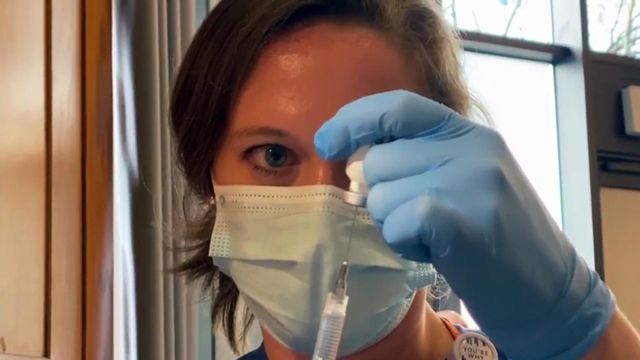NC in top 10 nationwide for getting vaccine doses out, but lags in shots per capita
North Carolina's distribution of coronavirus vaccines has not been without flaws. But while the state was originally in the bottom 10 nationwide for total shots administered and its per capita rate, it is beginning to rebound from that shaky start.
Posted — Updated"For the ninth-largest state [in population], we should be ninth on the list for all things if we’re getting our doses out every week," said Dr. Mandy Cohen, secretary of the North Carolina Department of Health and Human Services.
"We recognize the first few weeks of this, we did have vaccine on the shelf," Cohen said. "We certainly sped up and got all of our first doses out. But now, with the our second doses, you can’t rush them."
People who receive either the Moderna or the Pfizer vaccines need to wait weeks to get the second dose. Cohen attributes the state's current position to the slow roll out.
The state's position is improving, however. When WRAL Data Trackers began analyzing the data for this story, North Carolina was positioned in the bottom 15 for all metrics the CDC was measuring.
"I do think, over the next number of weeks, we'll catch up with in terms of getting all those second doses out," Cohen said. "Then, I think you'll see that kind of normalize to all of the doses and where we are in terms of ranking because the vaccines are being given out by the federal government by population."
What top states did differently
Because the vaccines are being distributed by population, it begs the question as to how states like West Virginia and Alaska are outpacing North Carolina by significant margins.
The answers vary.
Alaska, the nation's leader when it comes to doses administered per capita, has the highest rate of veterans per capita, a large military presence and more than 200 indigenous tribes. The state is receiving additional doses from the federal government because of all of those factors.
NC balances speed with equity
Other states, like Texas, created vaccination hubs. The state has been criticized for focusing too strongly on metro areas, leaving people in rural parts of the state with limited access to the vaccine.
North Carolina's approach has been to get the vaccine to all 100 counties. The state is the only one in the nation, as of now, tracking vaccine demographic data down to the county level.
"We really want to make sure we’re not just approaching this with speed, which I think we’ve proved to everyone we’re going fast," Cohen said. "We have to do it with equity."
The federal government urged states to prioritize certain people, including those age 65 or older and people who are at high risk from the virus due to underlying health conditions, for vaccinations, and while many states chose to do both groups, North Carolina didn't. As of now, state health officials have yet to move people who may be at high risk due to medical conditions up on the vaccination priority list.
Despite supply uncertainty, the state will soon be moving into the next phase, making teachers eligible for vaccinations as of Feb. 24. Health officials expect high demand but low supply to linger for months, if not years.
"There’s this trickle-down effect," said Jennifer Pancorbo, an expert in pharmaceutical manufacturing at North Carolina State University. "Even if you iron out some of the kinks here or there, there’s a bottle neck somewhere else."
Still, about 10 percent of the people in North Carolina have received at least one shot of the two-dose regimen. While some states, like Michigan, which has a higher administration rate, have announced targets, wanting to vaccinate 70 percent of that state’s eligible population by the end of the year, Cohen is hesitant to set such a goal because of the uncertain supply.
"I think it’s really hard to create a target when we don’t know the supply," she said. "If I don't have enough vaccine to get to that, is that really fair for any of us to hold ourselves to that level? So, what we want to say is we want to vaccinate as many people as want the vaccine as quickly as possible when we have the supply."
Cohen said, in general, she wishes the state could have planned better so the entire system ran smoother from the get-go. But overall, she would not do anything differently.
"I've always said I try not to Monday-morning quarterback," she said.
• Credits
Copyright 2024 by Capitol Broadcasting Company. All rights reserved. This material may not be published, broadcast, rewritten or redistributed.





